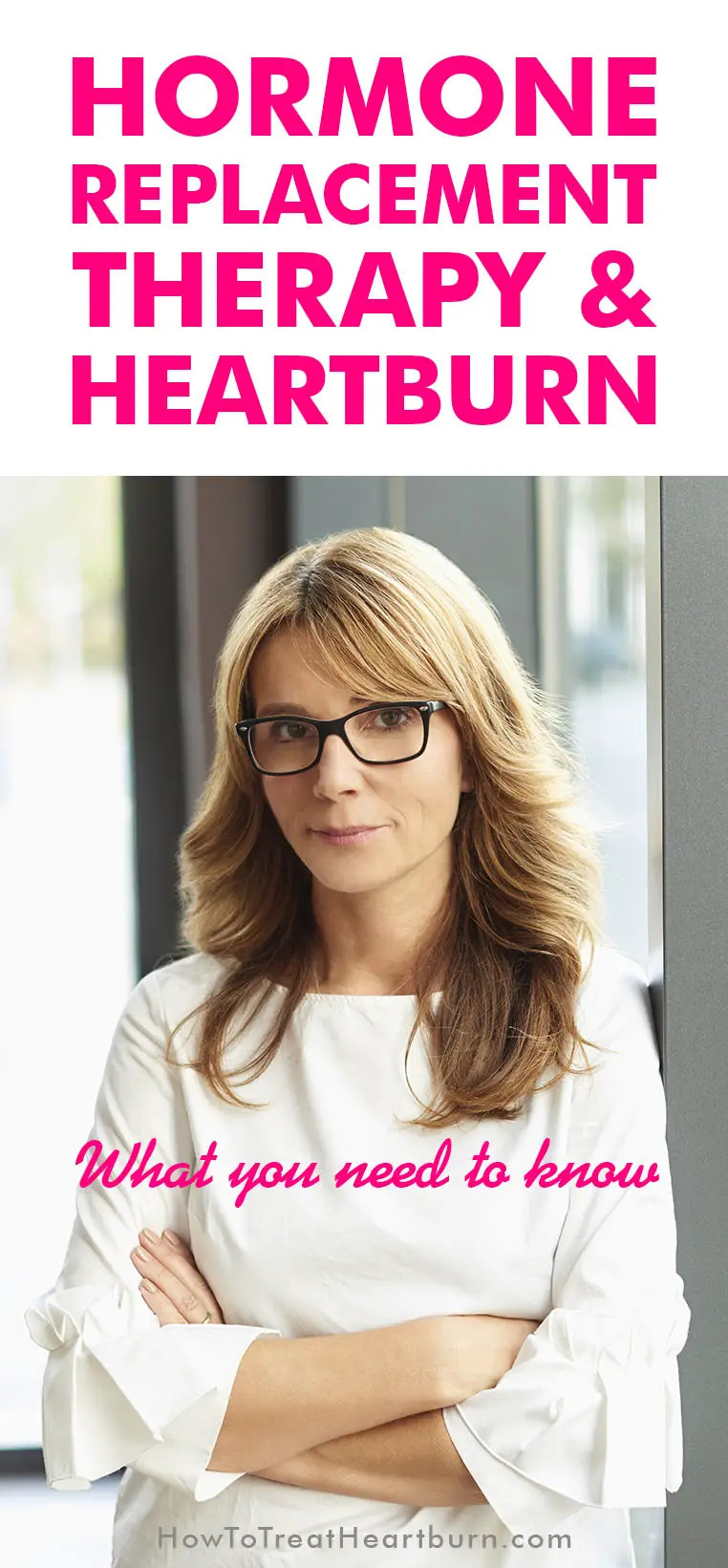Disclosure: I am compensated for purchases made through some links on this site. Click for details.
The practice of augmenting estrogen and progesterone through hormone replacement therapy (HRT) to minimize menopause symptoms or increase estrogen levels after having a hysterectomy causes heartburn and acid reflux in women leading to an increased risk of gastroesophageal reflux disease (GERD).
GERD symptoms occur because postmenopausal hormones, selective estrogen receptor modulators, and over-the-counter hormone preparations aggravate heartburn and acid reflux by influencing gastrointestinal motility and relaxation of the lower esophageal sphincter (LES).
What is Gastroesophageal Reflux Disease (GERD)?
Gastroesophageal reflux disease (GERD) is the chronic occurrence of acid reflux and accounts for one of the most common medical conditions seen by primary care physicians accounting for significant medical costs.1,2,3 Studies show that up to 60% of people are affected by GERD in the course of a year and 20% to 30% are affected weekly.
Acid reflux occurs when the lower esophageal sphincter (LES), a ring of muscle at the base of the esophagus, fails to close properly allowing stomach acid to back up (reflux) into the esophagus to cause the pain we know as heartburn.3
- Heartburn
- Bitter taste
- Excessive saliva
- Burping
- Hiccups
- Bloating
- Laryngitis
- Hoarseness
- Cough
- Nausea
- Vomiting
- Bloody stools or vomit
- Asthma
- Pneumonia
- Sore throat
- Dental erosion
- Bad breath
- Trouble swallowing
- Weight loss
Hormone Replacement Therapy Increases the Risk of GERD Symptoms
Hormone replacement therapy minimizes menopausal symptoms and helps prevent bone loss due to the drop in estrogen levels. Studies, however, have found that postmenopausal hormones, selective estrogen receptor modulators, and over-the-counter hormone preparations are not only associated with cancer and cardiovascular disease5,6 but also an increase in the risk of GERD.7,8
The risk of experiencing GERD symptoms increases when the estrogen dose is increased along with the duration of use.8 Discontinuation of hormone replacement therapy shows a decrease in risk of GERD symptoms over time.
HRT Causes Higher Risk of GERD Symptoms as BMI Increases
Hormone replacement therapy causes a higher risk of developing GERD symptoms as BMI increases. Body mass plays a major role in GERD development and treatment. Weight in the abdominal region can cause added pressure on the stomach which in turn places pressure on and compromises the LES.
The association between body mass and acid reflux is stronger in women than in men. The association is especially prominent in premenopausal women, and the use of hormone replacement therapy strengthens this association as body mass index (BMI) increases.9 These factors suggest that estrogen levels are a contributing factor in GERD… It’s also important to note that women taking estrogen to gain more weight after menopause than women taking other categories of hormone replacement therapy.
Increased Estrogen Levels Relax the LES Leading to Acid Reflux
Studies show that GERD symptoms increase whether estrogen and progesterone levels are elevated from internal or external sources. Relaxation of the LES occurs during pregnancy,10 with the sequential use of oral contraceptives11 and with the use of hormone replacement therapy.
Estrogen increases plasma nitric oxide levels,12 and nitric oxide causes smooth muscle relaxation. Smooth muscle relaxation causes the relaxation of the LES allowing stomach acid to reflux into the esophagus.13 Estrogen-only hormone replacement therapy causes higher plasma nitric oxide levels and has a stronger independent association with GERD symptoms than combined estrogen and progesterone therapy.14
Increased Risk GERD When taking NSAIDs and Tibolone
NSAIDs can irritate the esophageal lining causing heartburn and increase the severity of GERD or contribute to its development. The association between NSAIDs and GERD is higher with tibolone use than other hormone replacement therapy.15
Heartburn Prevention During Hormone Replacement Therapy
If hormone replacement therapy is used as a course of treatment, combined estrogen and progesterone hormone replacement therapy, as opposed to estrogen-only treatment, may help reduce the risk of GERD symptoms along with weight reduction.
Use of mucilage to help coat and protect the esophageal lining may be useful. Forms of mucilage to consider are:
- Licorice in the form of licorice root tea and deglycyrrhizinated licorice (DGL)
- Aloe vera in the form of juice, gel, powder, and softgel form. Use only aloe vera forms for internal use.
- Slippery elm in the form of tea, capsule, lozenge, and powder.
- Marshmallow root in the form of tea and capsule.
- Throat Coat tea (contains slippery elm, licorice, and marshmallow root).
Conclusion
Many women use hormone replacement therapy as an aid against the symptoms of menopause or to otherwise increase estrogen levels. Hormone replacement therapy can compromise the closure of the LES leading to chronic acid reflux and heartburn, a symptom of GERD.

References
1) J. Mason, & A.P.S. Hungin. “Review article: gastro‐oesophageal reflux disease – the health economic implications.” Alimentary Pharmacology & Therapeutics, July 24, 2005.
2) Ziad Younes MD, & David A.Johnson MD. “Diagnostic Evaluation in Gastroesophageal Reflux Disease.” ScienceDirect, Gastroenterology Clinics of North America, December 1, 1999, Volume 28, Issue 4, Pages 809-830.
3) “Symptoms & Causes of GER & GERD.” The National Institute of Diabetes and Digestive and Kidney Diseases, November 2014.
4) “Definition & Facts for GER & GERD.” The National Institute of Diabetes and Digestive and Kidney Diseases, November 2014.
5) Kjersti Bakke, Elin Alsake, Anne Elise Egge, & Eiliv Lund. “Hormone replacement therapy and incidence of hormone‐dependent cancers in the Norwegian Women and Cancer study.” The International Journal of Cancer (IJC), June 2, 2004.
6) Per Hall, Alexander Ploner, Judith Bjöhle, Fei Huang, Chin-Yo Lin, Edison T Liu, Lance D Miller, Hans Nordgren, Yudi Pawitan, Peter Shaw, Lambert Skoog, Johanna Smeds, Sara Wedrén, John Öhd, & Jonas Bergh. “Hormone-replacement therapy influences gene expression profiles and is associated with breast-cancer prognosis: a cohort study.” BMC Medicine, June 30, 2006.
7) Helen Close, James M Mason, Douglas Wilson, & A Pali S Hungin. “Hormone replacement therapy is associated with gastro-oesophageal reflux disease: a retrospective cohort study.” BMC Gastroenterology, May 29, 2012.
8) Brian C. Jacobson, MD, MPH, Beverly Moy, MD, MPH, Graham A. Colditz, MD, DrPH, & Charles S. Fuchs, MD, MPH. “Postmenopausal hormone use and symptoms of gastroesophageal reflux.” National Center for Biotechnology Information, U.S. National Library of Medicine, Archives of Internal Medicine, September 8, 2008.
9) Magnus Nilsson, MD; Roar Johnsen, MD, PhD; & Weimin Ye, MD. “Obesity and Estrogen as Risk Factors for Gastroesophageal Reflux Symptoms.” JAMA Network, July 2, 2003.
10) R S Fisher, G S Roberts, C J Grabowski, & S Cohen. “Inhibition of lower esophageal sphincter circular muscle by female sex hormones.” American Journal of Physiology-Endocrinology and Metabolism, March 1, 1978.
11) Van Thiel DH, Gavaler JS, & Stremple J. “Lower esophageal sphincter pressure in women using sequential oral contraceptives.” National Center for Biotechnology Information, U.S. National Library of Medicine, Gastroenterology, August, 1976.
12) Best PJ, Berger PB, Miller VM, & Lerman A. “The effect of estrogen replacement therapy on plasma nitric oxide and endothelin-1 levels in postmenopausal women.” National Center for Biotechnology Information, U.S. National Library of Medicine, Annals of Internal Medicine, February 15, 1988.
13) Ravinder K. Mittal, M.D., & David H. Balaban, M.D. “The Esophagogastric Junction.” The New England Journal of Medicine, March 27, 1997.
14) Hannu Jokela, Prasun Dastidar, Riikka Rontu, Anne Salomäki, Klaus Teisala, Terho Lehtimäki, & Reijo Punnonen. “Effects of Long-Term Estrogen Replacement Therapy Versus Combined Hormone Replacement Therapy on Nitric Oxide-Dependent Vasomotor Function.” The Journal of Clinical Endocrinology & Metabolism, September 1, 2003.
15) Steven R. Cummings, M.D., Bruce Ettinger, M.D., Pierre D. Delmas, M.D., Ph.D., Peter Kenemans, M.D., Ph.D., Victoria Stathopoulos, Ph.D., Pierre Verweij, Ph.D., Mirjam Mol-Arts, M.D., Lenus Kloosterboer, Ph.D., Lori Mosca, M.D., Ph.D., M.P.H., Claus Christiansen, M.D., John Bilezikian, M.D., & Eduardo Mario Kerzberg, M.D. “The Effects of Tibolone in Older Postmenopausal Women.” The New England Journal of Medicine, August 14, 2008.



I have been on HRT for 3 years lowest dose. Initially very good results which disguised the concurrent appearance of GERD like symptoms. I quit drinking coffee and wine, then tea, started taking PPI, then saw GP, GI, Cardiologist, had an endoscopy, chest X-ray, doubled my daily dose of PPI…Pulmonologist recommended Esophogeal Manometry. Then I had an episode of dysphasia and spasm. So I stopped PPI and HRT with the help of holistic supplements and miraculously I am better. The description of the effect HRT has on esophageal sphincter is spot on.
53 year old. Heathy and active until I started bio HRT. I have been on bio hormonal replacement for a month. Felt great for the first week and then it went downhill from there. Nausea every single day. Two trips to the ER. Major anxiety attacks. Migraine, heartburn. Can’t wait for the bio HRT effects to wear off. Never ever again. You have to weight in whether the hot flashes are wiorth relinquishing for worse side effects that will impair you well being. Will look at other options. Done with the pellets. I seriously do not recommend pellets if you’re petite size. It will be a rough ride.
I started Bioidentical HRT in Dec 2017. In Feb 2018, the Dr added an oral progesterone 100 mg daily to protect my uterus. March 25th, 2018 I woke up with what felt like a lump in my esophagus. This feeling continued for 2 weeks non stop 24/7. Then, added to the lump feeling, I started having what felt like a heart attack, tightness in my chest, feeling of slim in my throat, burping, throwing up after I eat and losing 15 pounds within two weeks. I have has CT scan, MRI, EKG, Barium Swallow, Chest Xray, and Endoscopy. The only thing that showed up on any test is mild Gastritis. I was put on PPI 40mg 2x daily. This just seemed to make everything worse. This has been going on for 2.5 months and I was losing all hope of feeling normal. I quit drinking caffeine, went gluten-free and removed soy from my already healthy diet. I am 53 yrs old, pescatarian and weigh 135. I don’t smoke or drink and I have never had any stomach/esophageal issues at all. I came across an article today, when trying to make sense of this miserable issue, and stumbled across the possibility of Progesterone being the culprit! It makes total sense! I have an appointment in 1 week for Hormone blood work. For now, I will discontinue the HRT. I would much rather have the night sweats and fatigue than the feeling I’ve been having for the past 2.5 months! Has anyone else experienced this?
Hi, I read the description of what you went thru and sincerely hope you are doing better. Would you mind telling us if you stopped the HRT and if yes , have your symptoms disappeared? Thank you.
Thank you, out of all the reading I have done on- line for my hormone therapy related reflux, this was the most helpful and reassuring.
Thank you for reading! Wishing you the best of health!